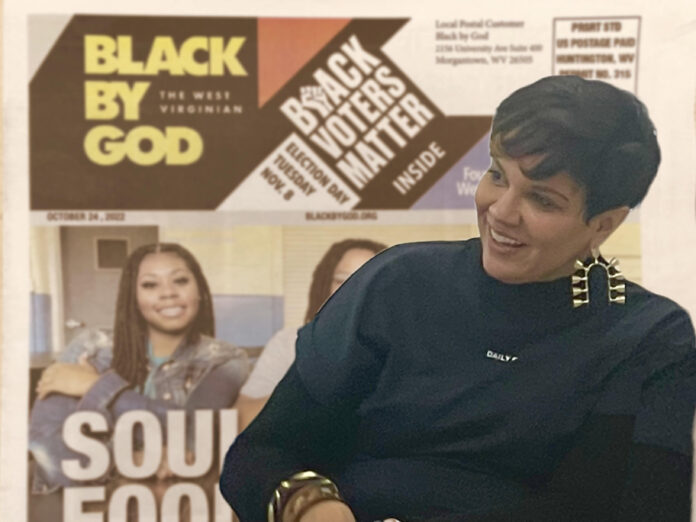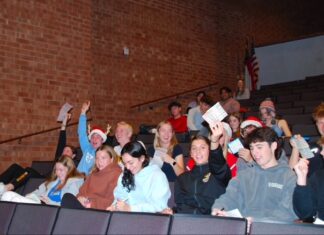
Crystal Good—a prominent poet, writer, and newspaper editor—was recently hosted by the University of North Carolina’s Southern Futures, a campus-wide initiative that aims “to reimagine the American South through vibrant scholarship, creative endeavors, and thoughtful conversations across disciplines.” Good is the founder of Black By God, West Virginia’s only community-led newspaper that intentionally aims to capture the Black experience in Appalachia and seeks to revitalize a 14-decade-long tradition.
Besides re-blazing the trail of Black-owned media in West Virginia, Good has worked as a model and musician; held high-ranking positions for research non-profit groups; and organized grassroots lobbying campaigns on behalf of the environment, women’s reproductive rights and marijuana legalization. She has published her own poetry book—the seminal collection Valley Girl—and given multiple TEDx Talks.
West Virginia’s last Black newspaper, the West Virginia Beacon Digest, shut down in 2006, leaving a void in the state’s media landscape. Good, who had attempted to purchase the Beacon Digest as a teenager but was unsuccessful, saw the Beacon Digest’s closure as an opportunity to fulfill her lifelong dream of owning and operating a newspaper, so she started Black By God from scratch a few years later.
Since founding Black By God in 2020, Good said she has been “living that 16-year-old’s dream which never died in me.”
The newspaper’s name is inspired by the phrase “West by God Virginia,” which has unclear origins but has long been used to represent the state and its people.
Black By God has filled the media gap in community newspapers in West Virginia following the dissolution of the aforementioned Beacon Digest. Good also took inspiration from the state’s first Black-owned newspaper, the Pioneer Press in the late 19th century.
“If Black folks in the 1800s could start a newspaper, and we have access to the Internet, I think we’ve got a chance,” Good said.
Good founded the newspaper while living in California, before returning to her home state of West Virginia to unexpected support.
“People were willing to meet folks at a gas station to hand out papers,” Good said. “People were giving us money. People were giving copies to old folks’ homes. Churches. It was so energizing to the community; the feedback was overwhelming.”
Good said her experience on her high school newspaper motivated her to pursue journalism, but perhaps not in the way one would expect.
“I had to work my way up [from selling ads], but I wanted to write…and I tried to buy a small newspaper from the publisher,” she said. “They said no but then [asked] me to sell ads for their paper,” Good said. “That never sat right with me because I always thought I had many more skills. The good thing is that I didn’t actually have all the skills necessary to run my own newspaper—yet.”
Since its inception, Black By God has grown to serve a wide audience through its online presence and monthly print edition.
Good said her paper has thrived by practicing non-traditional journalism, relying upon what Good calls the “folk reporter program.”
“I wanted to make [education surrounding legislative policy] more accessible to people. [I noticed a lack of] civic engagement because people weren’t showing up to public meetings,” Good said. “I’ve started a program called folk reporters, which is a blend of ethnographic principles and journalism so that everyday people can be citizen journalists and attend public meetings.”
Good said the program is unique in that it allows people to spread information without necessarily needing the skillset of a typical journalist.
“People don’t realize the power they have to go into a public meeting space and change things. Even just being a witness is powerful. With the folk reporters program, you don’t have to write a 2,500 word article. Maybe you take a picture, maybe you put a tweet out, maybe you share how you felt in a space. The point is, if somebody sees you go to a school board meeting they might go too,” Good said.
Good’s goal with Black By God is to get readers to take action. For that to happen, the newspaper must shed the old standards of a purely objective mission, and instead have what the newspaper stands for as an integral part of its focus.
“My formula for what I ask people to write about includes the traditional ‘who,’ ‘what,’ ‘when,’ ‘where,’ ‘why,’ and ‘how,’ but also ‘do.’ What do you want the people to do? When somebody reads this article, what can they go out and do? … Black By God is in the genre of movement journalism, where the mission is clear and up-front. As long as I’m keeping the mission facing forward, that gives me the right to keep publishing, as opposed to the old school journalism focused on objectivity.”
Good hopes for her newspaper to serve as a template for similar publications to serve various under-represented communities.
“I think that Black By God can be a model for any community,” Good explained. “Variations of the template could be tailored to fit any group of people, such as the LGBTQ community or any immigrant communities.”












Thank you! It was an honor to speak to the future of JOURNALISM!